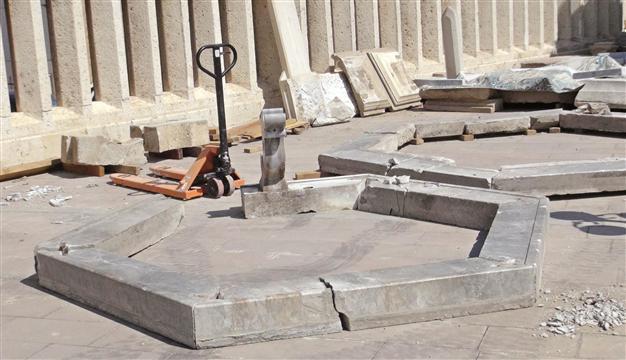Original Rumi pool removed at Konya’s Mevlana Museum
KONYA - Doğan News Agency

The Konya Provincial Culture Directorate removed the pool from in front of dervish cells as part of rearrangement works at the Mevlana Museum and placed a new one using the similar stones.
Officials in Konya have raised controversy just before events marking the 740th anniversary of Jalaladdin Rumi’s passing after a centuries-old pool in the garden of the Mevlana Museum was removed and rebuilt elsewhere with similar stones.“Similar stones were used to build a similar pool in a different place,” said Erdoğan Erol, who worked as a director for the museum for 25 years before retiring. “In my opinion, this is a murder. It should be changed back.”
Erol criticized the change for breaking a link between the ancient stones and the place where the sema is organized. “Most of the stones were broken while being removed. I don’t know where they are being kept and don’t understand why these stones were changed. Officials say the decision was given by the Council of Monuments, but I learned that the chairman of the council was not at the meeting during which this decision was taken. It should be investigated,” he said.
Speaking about the claims, the Mevlana Museum Director Yusuf Benli said the works were still continuing. When asked if former stones would be replaced, he said, “We will see the result when the works are done.”
The Konya Provincial Culture Directorate removed the pool from in front of dervish cells three months ago as part of rearrangement works at the Mevlana Museum.
The pool is called “Şeb-i Arus,” which means “Wedding Day,” because the dervishes perform sema dances around the pool on the Dec. 17 anniversary of Rumi’s death – or his wedding with God – every year.
During the rearrangement works, the original marble stones of the pool were broken into pieces while being removed. Using similar stones, a new pool was built in a place 3.5 meters away.
There are two types of documents in literature about the pool, Erol said. “The first is written resources in books and the other is stories passed down from father to son. These stories are as respected as written resources. As our grandfathers told us, this place was a rose garden in the Seljuk Palace and was given to the father of Rumi by the sultan of that period, Alaeddin Keykubat. The pool inside the rose garden is the oldest structure of the garden. According to this, the pool has a history of 1,000 years.”
Dervishes performed sema
Erol said that after the death of Rumi, dervishes performed sema dance around the pool in good weather conditions. “Şeb-i Arus means wedding and bride night. Rumi said, ‘Do not cry when I die because I won’t die. I will reunite with my love, God. This is why this is not the night of death but the night of a wedding.’ This is why the death anniversary of Rumi is celebrated. Sema dances are organized around the pool,” he said.
















